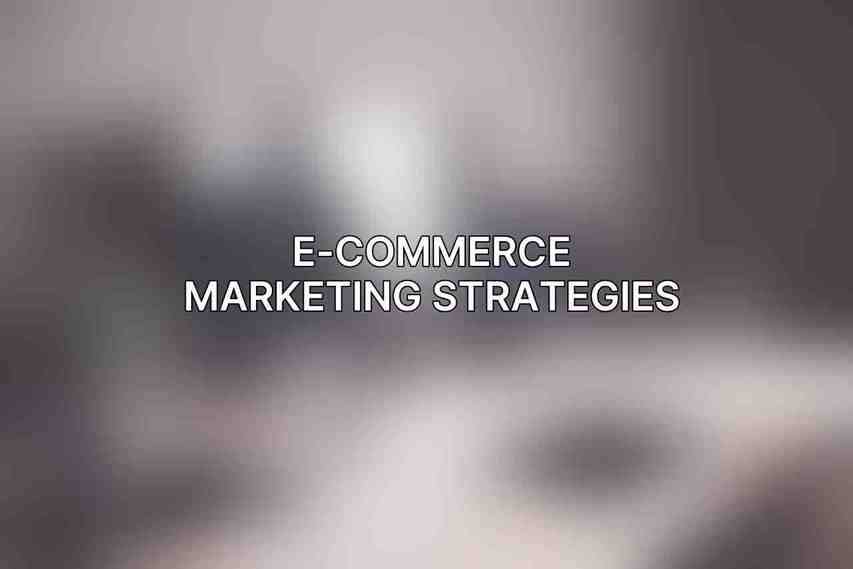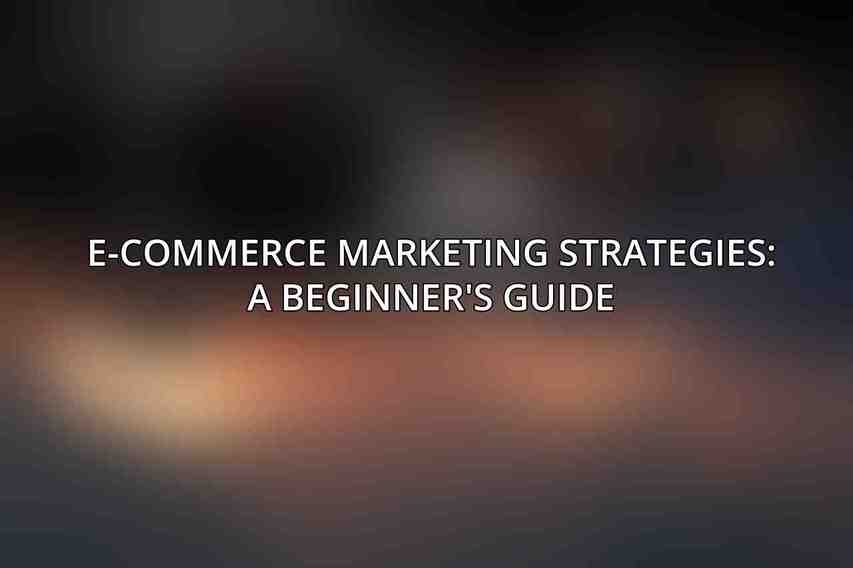e-commerce marketing plays a pivotal role in reaching customers, driving sales, and establishing brand presence on digital platforms. E-commerce Marketing involves the strategies and tactics employed by businesses to promote and sell their products or services online. The significance of E-commerce Marketing lies in its ability to expand market reach, increase brand visibility, and facilitate convenient shopping experiences for customers.
Definition and Importance
E-commerce Marketing refers to the utilization of various online channels such as websites, social media, email, and search engines to promote products or services and drive sales. It is an essential component for businesses operating in the digital realm, enabling them to connect with a global audience and compete in the online marketplace effectively.
Benefits of E-commerce Marketing
The benefits of E-commerce Marketing are manifold, ranging from increased brand awareness and customer engagement to higher conversion rates and sales growth. By leveraging E-commerce Marketing strategies, businesses can target specific customer segments, track marketing performance in real-time, and personalize interactions to enhance customer loyalty.
Challenges of E-commerce Marketing
Despite its advantages, E-commerce Marketing comes with its own set of challenges. These may include fierce competition, rapidly evolving technologies, changing consumer behaviors, and the need to adapt to algorithm updates on various online platforms. Overcoming these challenges requires a strategic approach, continuous learning, and staying abreast of industry trends.
Target Audience and Market Research

For a successful E-commerce Marketing campaign, understanding your target audience and conducting thorough market research are crucial steps. These processes provide valuable insights into consumer preferences, behaviors, and market trends, enabling businesses to tailor their marketing strategies effectively.
Identifying Your Target Audience
Identifying your target audience involves creating detailed buyer personas that represent your ideal customers. By defining factors such as demographics, interests, and buying habits, businesses can target their marketing efforts more accurately and deliver personalized experiences to customers.
Conducting Market Research
Market research encompasses both primary and secondary methods to gather data about market trends, competitor strategies, and consumer sentiments.
Primary Research Methods
Primary research involves collecting firsthand data through surveys, interviews, or focus groups to gain direct insights into customer preferences and market needs.
Secondary Research Methods
Secondary research entails analyzing existing data, industry reports, and competitor analysis to understand market dynamics, consumer behavior, and emerging trends.
E-commerce Marketing Strategies

Implementing the right E-commerce Marketing strategies can drive traffic, boost conversions, and foster long-term customer relationships. Here are some effective strategies to consider:
Content Marketing
Content Marketing involves creating and distributing valuable content to attract and engage target audiences. Blog posting, social media marketing, and influencer partnerships are key components of a robust Content Marketing strategy.
| Content Marketing Strategies | Description |
|---|---|
| Blog Posting | Publishing informative blog articles related to your products or industry to educate and engage your audience. |
| Social Media Marketing | Leveraging social media platforms to share content, interact with followers, and build brand credibility. |
| Influencer Partnerships | Collaborating with influential individuals in your industry to promote your products/services to their followers. |
Search Engine Optimization (SEO)
Search Engine Optimization is the practice of optimizing your website to improve its visibility and ranking on search engine results pages. On-page optimization and off-page optimization are vital for enhancing your website’s SEO performance.
On-Page Optimization
On-page optimization focuses on optimizing your website’s content, metadata, and structure to make it more search engine-friendly and user-friendly.
Off-Page Optimization
Off-page optimization involves building backlinks, social signals, and other external factors that contribute to your website’s authority and credibility in search engines’ eyes. Learn more about Email Marketing Mastery for E-commerce Businesses
Paid Advertising
Paid Advertising allows businesses to reach their target audience through paid placements on various online platforms. Pay-Per-Click (PPC) campaigns, social media advertising, and display advertising are common forms of paid advertising in E-commerce Marketing.
Pay-Per-Click (PPC) Campaigns
PPC campaigns involve paying for ads that appear on search engine results pages based on specific keywords. Businesses only pay when users click on their ads, making it a cost-effective advertising model.
Social Media Advertising
Social media advertising enables businesses to run targeted ads on popular social media platforms to reach specific demographics, increase brand visibility, and drive conversions.
Display Advertising
Display advertising involves placing visual ads on websites, apps, or social media platforms to reach a broader audience and increase brand awareness.
Stay tuned for the continuation of the E-commerce Marketing Strategies guide in the next message… Read more on Maximize Sales with Social Media Marketing for Your Online Store
Frequently Asked Questions
What are some effective e-commerce marketing strategies for beginners?
Some effective e-commerce marketing strategies for beginners include utilizing social media platforms, creating compelling content, implementing email marketing campaigns, optimizing your website for search engines, and leveraging influencer marketing.
How can I target the right audience for my e-commerce business?
To target the right audience for your e-commerce business, you can conduct market research to understand your target demographic, use social media insights and analytics to identify your audience, create buyer personas, and tailor your marketing messages accordingly.
What role does SEO play in e-commerce marketing?
SEO (Search Engine Optimization) plays a crucial role in e-commerce marketing as it helps improve your website’s visibility in search engine results, drive organic traffic, and increase your chances of reaching potential customers who are actively searching for products or services you offer.
What is the importance of content marketing in e-commerce?
Content marketing is essential in e-commerce as it helps attract and engage customers, build brand awareness, establish authority in your niche, and drive organic traffic to your website through valuable and relevant content such as blog posts, videos, infographics, and product descriptions.
How can I measure the success of my e-commerce marketing strategies?
You can measure the success of your e-commerce marketing strategies by tracking key performance indicators (KPIs) such as website traffic, conversion rates, customer acquisition cost, return on investment (ROI), email open rates, social media engagement, and sales revenue.

